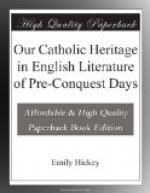We hope the lady betook herself to the sea-mew’s home, and found her beloved at the end of the journey! Her beloved had no thought of any greater joy than the granting of Almighty God that together they should be givers of treasure to men. The beloved has enough of beaten gold and wealth, and a fair home among the strangers, the noble warriors that obey him. Banished from home, gone forth a homeless one, in the stranger-land good has come to him; he has no lack of anything but of her, who had with him come under an old threat, and had been parted from him. He vows to fulfil his pledge and love-troth, and he writes in runes some message, which she, as it appears, would understand, and she alone.
The old, old story, written fair and full.
You will have noticed in the literature we have been considering the absence of certain elements which are an integral part of our modern literature. This poem, for instance, is, as far as I know, the only love poem before the Conquest which has come down to us. There is no romance either, and there is, we may say, no humour. Life is a very serious thing, so often lying close to the sword-edge; and the duties of life are simple. There is to be a great, very great enlargement of the borders of English literature later on. Prose and poetry are to have new developments. Romances are to show us heroic ideals. Lyrics of joy, of sorrow, of passion, of emotion natural and spiritual, are to be sung. The sense of beauty is to grow. The drama is to arise from beginnings to be but faintly traced in early days. Epic poetry is to take a great place. Character modified, enriched by foreign strains, is to mould a noble literature—noble through many and many a gift and grace. A great poet is to arise with sympathies large and wide, to show us, in verse most musical, in words full meaning, with that grace of humour which is a fresh light upon life, how men and women lived: and to be the great precursor of a greater than he. Geoffrey Chaucer is to come to us. After him William Shakespere.
THE END
THE MERCAT PRESS, EDINBURGH.



